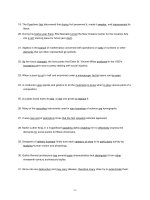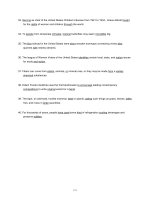Tài liệu TOEFL STUDY GUIDE PART 3-3 STRUCTURE AND WRITTEN EXPRESSION doc
Bạn đang xem bản rút gọn của tài liệu. Xem và tải ngay bản đầy đủ của tài liệu tại đây (18.47 KB, 8 trang )
TOEFL STUDY GUIDE
PART 3
STRUCTURE AND WRITTEN EXPRESSION
Error Identification Tips 51 – 59 (cont)
Structure: Error Identification TIP 54
Seven Common Errors: Error #3
Pronouns
Pronoun agreement: Make sure the pronoun agrees with the
noun it replaces in terms of number, case, and gender. For
example, "I was sure I had the money because I remember
counting it." This sentence is correct; it would be incorrect to
say, "I was sure I had the money because I remember
counting them."
Missing pronouns, such as "He took the money from my
purse but he promised to replace...."; This sentence should
read, "He took the money from my purse but he promised to
replace it."
Extra pronouns: If you see a noun and a pronoun right next to
each other, one is probably unnecessary (especially as an
unnecessary second subject). for example, "The child he is
very stubborn" should read, "The child is very stubborn."
Structure: Error Identification TIP 55
Seven Common Errors: Error #4
Diction
Watch out for the use of a verb instead of a noun or vice
versa! For example:
Wrong: "He is quick to reaction."
Correct: "He is quick to react."
Nouns and adjectives may sometimes sound alike. For
example:
Wrong: "He is coldness."
Correct: "He is cold."
Adjective-Adverb (adverbs often end in -ly but there are many
exceptions). For example:
"The puppy is big." ("big" is an adjective and modifies "puppy".)
"The puppy has grown bigger." ("bigger" is an adverb and modifies
the verb "has grown".)
The normal rule for forming an adverb is to add 'ly' to the adjective, such as
"slow; slowly", "beautiful; beautifully", "shy; shyly", etc. For example:
Adjective: "The slow train is late".
Adverb: "The train moves slowly".
Some words may appear misspelled. Some favorite errors on the TOEFL
include using the word for a profession, such as "chemist", instead of the
word for the subject, "chemistry".
Wrong: "He studies chemist."
Correct: "He studies chemistry."
Other typical mistakes for words that sound alike:
weigh/way
weather/whether
decent/descent
complements/compliments
principal/principle
basis/ base
except/accept
These words may sound the same but have very different meanings.
Structure: Error Identification TIP 56
Seven Common Errors: Error #5
Parallelism
The rule is that items in a list must be in the same form. For
example:
"Eileen loved to run, doing her homework, and to
watch television." You must change "doing her
homework" to "do her homework." You could also
say, "Eileen loved running, doing her homework, and
watching televison."
Seven Common Errors: Error #6
Quantity and Comparison Words
Quantity:
When expressing a quantity of a countable noun, use fewer,
number, and many.
When expressing a quantity of a noncountable noun, use
"less, quantity, amount, little,and much.
Remember, much is used for quantity, many for number. Examples
of these rules are:
"He hasn't much money, but he has many friends."
"He eats little chocolate and few sweets."
l Much before a noun or modifying a verb is rarely used in an affirmative
statement or command. It is often replaced with "a lot of", "a good deal
of", or "plenty of". For example:
"I have spent a lot of money."
"Bring a lot of cheese."
"I enjoyed it a lot."
However, "very much, too much, and so much" are used more
commonly. For example:
"I have spent too much money."
"I enjoyed myself very much."
"There is so much to do."
However, much is used in a negative or interogative sentence. It also can
follow verbs of a negative meaning, such as "deny, forbid, or doubt." For
example:
"You won't find much left."
"Have you much to do?"
"I forbid you to bring much with you."
Structure: Error Identification TIP 57









